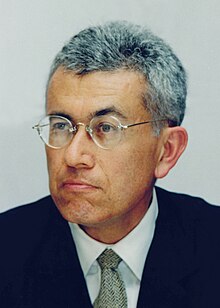
Back روبرتو مانغاميرا أنغر Arabic روبيرتو مانجابيرا ونجير ARZ Roberto Mangabeira Unger German Roberto Mangabeira Unger Spanish روبرتو مانگابیرا آنگر Persian Roberto Mangabeira Unger French ロベルト・マンガベイラ・アンガー Japanese Roberto Mangabeira Unger Polish روبرتو مانګابیرا اونګر Pashto/Pushto Roberto Mangabeira Unger Portuguese
Roberto Mangabeira Unger | |
|---|---|
 | |
| Born | March 24, 1947 |
| Education | Federal University of Rio de Janeiro (BA) Harvard University (LLM, SJD) |
| Era | 20th-/21st-century philosophy |
| Region | Western philosophy |
| School | Radical pragmatism[1] |
Main interests | Social theory · Legal theory · Economics · Political philosophy · Natural philosophy |
Notable ideas | False necessity · formative context · negative capability · empowered democracy · radical pragmatism[1] · transformative vocation[2] · institutional alternatives |
| Website | robertounger.com |
Roberto Mangabeira Unger (/ˈʌŋɡər/; born 24 March 1947) is a Brazilian philosopher, jurist and politician.[3] His work is in the tradition of classical social theory and pragmatism, and is developed across many fields including legal theory, philosophy and religion, social and political theory, progressive alternatives, and economics.[4] In natural philosophy he is known for The Singular Universe and the Reality of Time. In social theory he is known for Politics: A Work in Constructive Social Theory. In legal theory he was associated with the Critical Legal Studies movement, which helped disrupt the methodological consensus in American law schools.[5] His political activity helped the transition to democracy in Brazil in the aftermath of the military regime, and culminated with his appointment as Brazil's Minister of Strategic Affairs in 2007 and again in 2015.[6][7][8] His work is seen to offer a vision of humanity and a program to empower individuals and change institutions.[9][10][11]
At the core of his philosophy is a view of humanity as greater than the contexts in which it is placed. He sees each individual possessed with the capability to rise to a greater life. At the root of his social thought is the conviction that the social world is made and imagined. His work begins from the premise that no natural or necessary social, political, or economic arrangements underlie individual or social activity. Property rights, liberal democracy, wage labor—for Unger, these are all historical artifacts that have no necessary relation to the goals of free and prosperous human activity. For Unger, the market, the state, and human social organization should not be set in predetermined institutional arrangements, but need to be left open to experimentation and revision according to what works for the project of individual and collective empowerment. Doing so, he holds, will enable human liberation.[6][12][13]
Unger has long been active in Brazilian opposition politics. He was one of the founding members of the Brazilian Democratic Movement Party and drafted its manifesto.[14] He directed the presidential campaigns of Leonel Brizola and Ciro Gomes, ran for the Chamber of Deputies, and twice launched exploratory bids for the Brazilian presidency. He served as the Minister of Strategic Affairs in the second Luiz Inácio Lula da Silva administration and in the second Dilma administration.
- ^ a b Ruth Levitas, "Pragmatism, Utopia and Anti-Utopia", A Journal of Philosophy and Social Theory 9(1), 2008, pp. 42–59.
- ^ Unger, Roberto Mangabeira (1987), Social Theory: Its Situation and Its Task, New York: Verso, pp. 26–35.
- ^ Rathbone, John Paul (3 October 2014). "Lunch with the FT: Roberto Mangabeira Unger". Financial Times.
- ^ "Roberto Mangabeira Unger's personal website". Roberto Mangabeira Unger's personal website.
- ^ Waldron, Jeremy. "Dirty Little Secret", Columbia Law Review 98, 1 March 1998.
- ^ a b Keliher, Macabe (2 July 2012). "A Vision and a Program for the American Left". Retrieved 5 July 2012.
- ^ Anderson, Perry, "Roberto Unger and the Politics of Empowerment", New Left Review 173 (February 1989).
- ^ Haubert, Mariana (3 February 2015). "Dilma faz primeira troca de comando ministerial em seu segundo governo". Folha de São Paulo. Retrieved 4 February 2015.
- ^ Smolin, Lee. "No Eternal Truths, Just Divine Advancements", Times Higher Education Supplement, 31 August 2007.
- ^ Neu, Jerome. "Looking All around for Our Real Selves", New York Times Book Review, 8 July 1984, p. 24
- ^ "We Go To Sleep And Drown Our Sorrows In Consumption". The European. Retrieved 7 May 2014.
- ^ Lovin, Robin (1990). Critique and construction: a symposium on Roberto Unger's Politics. Cambridge: Cambridge University Press. ISBN 0-521-35208-8.
- ^ Connolly, William (February 7, 1988). "Making the friendly world behave". New York Times.
- ^ Simon, William H. "Social Theory and Political Practice: Unger's Brazilian Journalism", Northwestern University Law Review 81 (1986-87): p. 312.
© MMXXIII Rich X Search. We shall prevail. All rights reserved. Rich X Search